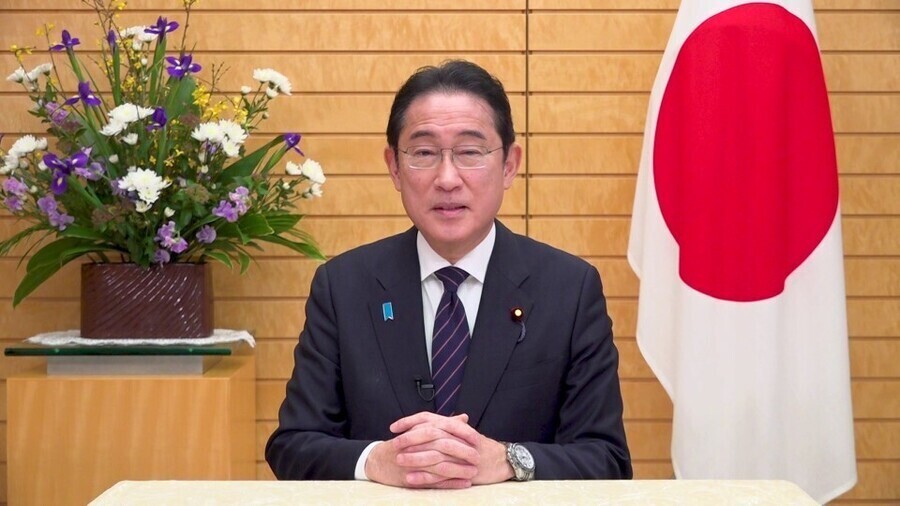hankyoreh
Links to other country sites 다른 나라 사이트 링크
In departure from Abe, Kishida will not express remorse for WWII before US Congress

Japanese Prime Minister Fumio Kishida will not mention remorse for World War II or other incidents from the past when he delivers an address before a joint session of the US Congress on April 11, during an upcoming state visit to the US, Japanese news outlets have reported.
Japan’s Jiji Press reported on Wednesday that Kishida had reached that decision, quoting multiple officials in the Japanese government.
When asked whether Kishida’s address before the two houses of Congress will address remorse for Japan’s past actions, an unidentified official in the Japanese Ministry of Foreign Affairs said that those past issues have been “settled” and that Kishida will not bring them up in his address.
If he does not mention anything about remorse for Japan’s historical actions in his address, this will mark a step backward even when compared with his late predecessor Shinzo Abe, who was criticized for what many called “historical revisionism.”
In an address delivered to Congress in April 2015, Abe said, “Post war, we started out on our path bearing in mind feelings of deep remorse over the war [World War II].”
“Our actions brought suffering to the peoples in Asian countries. We must not avert our eyes from that,” he declared at the time, stressing that he would “uphold the views expressed by the previous [Japanese] prime ministers in this regard.”
Afterward, Abe faced criticism for not clearly expressing remorse over Japan’s history of aggression and colonization. Kishida’s actions would go a step further than that.
The news agency also said Kishida planned to emphasize the US and Japan’s status as “global partners” in his address on April 11.
The same day, the Yomiuri Shimbun newspaper published a report quoting multiple Japanese government sources as saying the joint summit statement to be announced on Wednesday would include content about the two sides bolstering their “strategic cooperation” in fields such as national security and advanced technology, with China a particular target. To this end, it was expected to define the US and Japan as “global partners for the future.”
If Kishida ends up not mentioning remorse in his address to the US Congress, this will once again confirm that the “concession diplomacy” approach adopted by the Yoon Suk-yeol administration has turned out to involve unilateral concessions by Seoul without any good-faith response from Tokyo.
On March 6 of last year, the Yoon administration announced its plan for third-party compensation of forced labor victims, which involved the Korean government-run Foundation for Victims of Forced Mobilization by Imperial Japan paying out damages rather than the Japanese corporations being taken to court by victims and their families. The announcement was accompanied by a call for a good-faith response from Japan.
However, Tokyo responded only by reiterating that “the Japanese government inherits, as a whole, the positions of previous cabinets on historical recognition, including the Japan-South Korea Joint Declaration of 1998.”
Yet even the notion of inheriting the positions of previous cabinets was dropped from a diplomatic bluebook published by Japan a month later, on April 11, 2023.
By Cho Ki-weon, staff reporter; Kim So-youn, Tokyo correspondent
Please direct questions or comments to [english@hani.co.kr]

Editorial・opinion
![[Column] Season 2 of special prosecutor probe may be coming to Korea soon [Column] Season 2 of special prosecutor probe may be coming to Korea soon](https://flexible.img.hani.co.kr/flexible/normal/500/300/imgdb/original/2024/0426/3317141030699447.jpg) [Column] Season 2 of special prosecutor probe may be coming to Korea soon
[Column] Season 2 of special prosecutor probe may be coming to Korea soon![[Column] Park Geun-hye déjà vu in Yoon Suk-yeol [Column] Park Geun-hye déjà vu in Yoon Suk-yeol](https://flexible.img.hani.co.kr/flexible/normal/500/300/imgdb/original/2024/0424/651713945113788.jpg) [Column] Park Geun-hye déjà vu in Yoon Suk-yeol
[Column] Park Geun-hye déjà vu in Yoon Suk-yeol- [Editorial] New weight of N. Korea’s nuclear threats makes dialogue all the more urgent
- [Guest essay] The real reason Korea’s new right wants to dub Rhee a founding father
- [Column] ‘Choson’: Is it time we start referring to N. Korea in its own terms?
- [Editorial] Japan’s rewriting of history with Korea has gone too far
- [Column] The president’s questionable capacity for dialogue
- [Column] Are chaebol firms just pizza pies for families to divvy up as they please?
- [Column] Has Korea, too, crossed the Rubicon on China?
- [Correspondent’s column] In Japan’s alliance with US, echoes of its past alliances with UK
Most viewed articles
- 1‘We must say no’: Seoul defense chief on Korean, USFK involvement in hypothetical Taiwan crisis
- 2After election rout, Yoon’s left with 3 choices for dealing with the opposition
- 3AI is catching up with humans at a ‘shocking’ rate
- 4Why Kim Jong-un is scrapping the term ‘Day of the Sun’ and toning down fanfare for predecessors
- 5[Editorial] Korea’s surprise Q1 growth requires objective assessment, not blind fanfare
- 6Noting shared ‘values,’ Korea hints at passport-free travel with Japan
- 7Two factors that’ll decide if Korea’s economy keeps on its upward trend
- 8Gangnam murderer says he killed “because women have always ignored me”
- 9The dream K-drama boyfriend stealing hearts and screens in Japan
- 10Yoon says collective action by doctors ‘shakes foundations of liberty and rule of law’